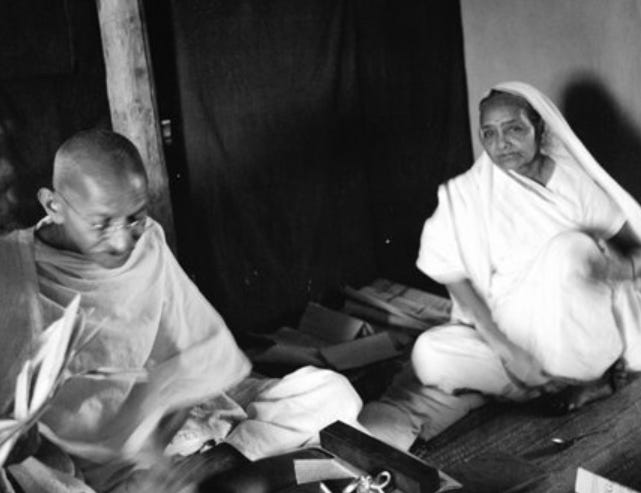Like millions of Indians, Kasturba Gandhi’s political activism often followed her famous husband’s path. But in February 1939, the roles were reversed; she found Gandhi following after her.

It was a few months before her seventieth birthday, and there was political unrest in Rajkot, where she had grown up and started her family. “She felt a personal call,” Gandhi would later write. “She could not sit still whilst the other daughters of Rajkot were suffering.” Determined to help rally the women of that city against its dictatorial ruler, Kasturba said goodbye to her reluctant husband and set off. Unfortunately, she was arrested immediately on arriving February 3.
Jail-going had been a family occupation for 30 years, so this was nothing unusual for the Gandhis. Kasturba’s prestige kept her out of state jail; instead, she was sequestered at a summer cottage outside the city. The cottage had a scandalous reputation among the women of Rajkot, which Kasturba's grandson Arun attributed as a reason so many were engaging in civil disobedience. “It was the prince's habit,” he wrote, “to kidnap beautiful young girls [and] take them to his royal 'fun house.'”1
Once he heard Kasturba was incarcerated, Gandhi wrote daily letters to her offering encouragement, and then headed to Rajkot at the end of the month. On February 28, he visited political prisoners in two state jails, and then went to the infamous cottage to see his wife.
They ate a meal of simple prison food and talked. The details of the marital conversation are long lost, but it's reasonable to speculate that they reminisced about their shared history in Rajkot. It was where they'd first lived as husband and wife, young Mohandas Gandhi himself just 12 years old. Their room in the family house was adequate, but too small when the teenage couple fought. Kasturba had given birth twice before Gandhi had left for law school at the age of 18. In the half century since, they had traveled countless miles together; South Africa, England, and across India.
Gandhi must have appraised his wife's health. Her decades were showing; the month before she'd fainted in the bathroom, and might have died if their youngest son hadn't acted quickly. Despite the risks, she'd been determined to strike out for Rajkot, and he acquiesced. Kasturba had followed him across the continents, across the decades, but in this struggle, in Rajkot, she was blazing a path for him to follow.
How could he support her now? Gandhi unsheathed his most potent weapon. Demanding that Rajkot’s ruler release all the political prisoners and appoint a committee to establish democratic reforms, he announced a fast to the death would begin on March 3, 1939.
If you could choose one living person to bring attention to a cause important to you, who and what would it be?
Kasturba: A Life (Arun Gandhi, 2000) p. 271


